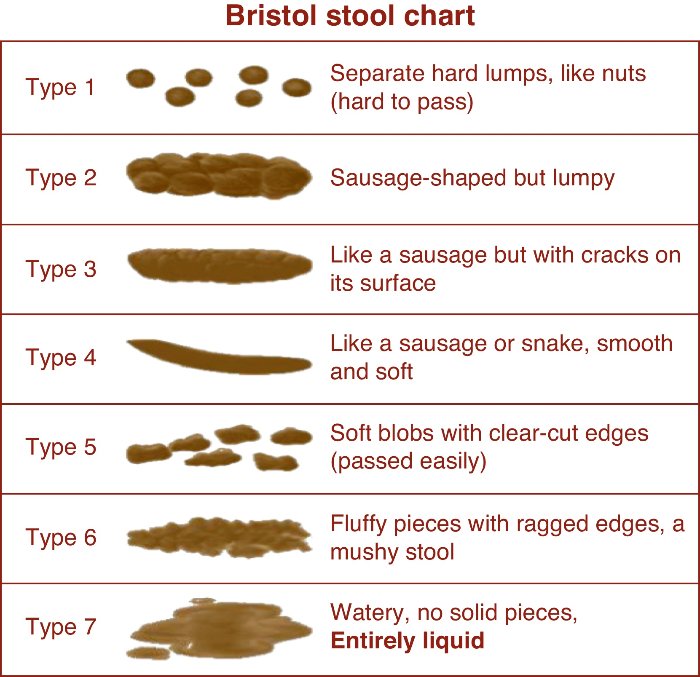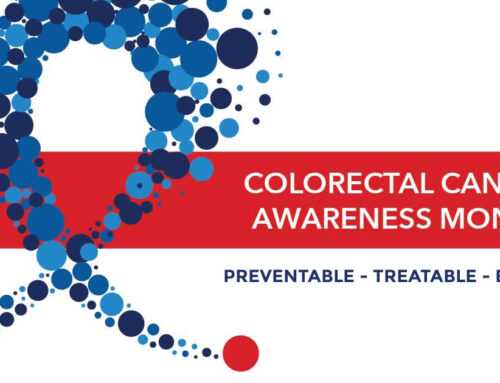Pooping. We all do it! But have you ever experienced a sudden change in your stools?
Maybe they turned green or black one day?
Or you went three days without pooping – when you usually go at least once a day!
Maybe it’s lumpier than usual?
Or maybe it has a foul odor – and not even the air freshener can mask it!
Amazingly, your poop can tell us a lot about your health and what’s going on in your gastrointestinal tract – and whether you should go see a GI doctor.
Understanding the Bristol Stool Scale
The Bristol Stool Scale is a useful reference for patients and healthcare professionals to check if the form of poop is healthy – looking at size, shape and consistency. In case you’re wondering, the chart is named after the hospital at which it was developed – The Bristol Royal Infirmary, a teaching hospital in England.
The Bristol Stool Scale depicts 7 types of stool, ranging from the hard and difficult to pass to the liquid form of diarrhea. Your poop is made up of waste products your body needs to remove, which may include undigested food (such as fiber, which cannot be digested), bacteria and salts.
Type 1 – Separate hard lumps, often difficult to pass and sometimes described as resembling nuts in shape and size.
Type 2 – A lumpy sausage shape that can also be difficult to pass.
Type 3 – Sausage-shaped, but with several cracks running across the surface.
Type 4 – A smooth long snake shape, no cracks or lumps.
Type 5 – A series of soft blobs with well-defined edges
Type 6 – Mushy consistency with ragged edges, looking more like a pile than clear separate stools.
Type 7 – Liquid in form, containing no solid pieces.
But what can the Bristol Stool Scale tell you about your health?

If Bowel Movements Could Talk
The reason the Bristol Stool Scale is so useful is that it indicates when poop is normal and – alongside some additional monitoring on color, smell and frequency – when it’s abnormal. Knowing if your stools are not normal enables us to investigate the possible underlying causes of your poop issues.
6 Things Your Bowels Are Trying To Tell You:
1. Signs of Healthy Digestion
The good news is that if you have Bristol Type 3 or 4 – your poop is normal! You’re getting enough water and fiber, and your stools are healthy.
2. Indicator of Constipation
Bristol Type 1 or 2, where the poop is hard and difficult to pass, are indicative of constipation. Often, these types of stool can be painful to pass. Short-term constipation is nothing to sweat about – but if you’ve been experiencing it for weeks or even months, it’s time to see a gastroenterologist to get checked out.
Constipation can be an indicator of the following conditions:
- Poor lifestyle choices – A sedentary lifestyle, a diet lacking in nutrition or simply not drinking enough plain water.
- Diabetes – Poorly managed diabetes can damage the nerves supplying the digestive tract, causing constipation.
- Thyroid conditions – Low levels of thyroid hormone often leads to chronic constipation.
- Pregnancy – An increase in the hormone progesterone during pregnancy relaxes the muscles in the lining of the digestive tract, leading to more sluggish movement of the bowels and constipation.
- Bowel obstruction – When a blockage inside your colon prevents your waste from passing through your digestive tract, constipation can be one of the first signs, but abdominal pain or cramping and a bloated stomach are other important indicators. You must contact your doctor immediately if you suspect bowel obstruction – it’s very serious.
3.Indicator of Diarrhea
Bristol Types 5 through 7 are consistent with diarrhea. Type 5 suggests that a lack of fiber is the main problem, while 6 and 7 suggest an inflammatory process. When there’s too much water but not enough fiber in your stool, it causes your poop to become too soft – usually, the fiber in your poop soaks up the water.
Inflammatory diarrhea occurs as a response to food poisoning, other severe infections or as a result of Inflammatory Bowel Disease (Crohn’s disease or Ulcerative Colitis).
4. Stool Color
The color of adult poop can also reveal a lot about your health:
Dark brown – A healthy color caused by bilirubin – a pigment released by the breakdown of old red blood cells.
Black – Iron supplements and certain foods and medications can cause black stools, but a black, sticky, tar-like appearance may be due to gastrointestinal bleeding.
White – A lack of bile caused by issues with the gallbladder, liver or pancreas can cause pale grey or white stools.
Green – Certain plant foods can cause your poop to turn green. Green poop can also be due to too much bile or too little bilirubin.
Red – Certain red foods can cause your poop to turn red, but red-colored poop can also be the result of intestinal bleeding or hemorrhoids.
Orange – Foods rich in beta-carotene, such as carrots, can turn your stools orange. Blocked bile ducts and certain medications can cause your poop to turn orange as well.
Yellow – A yellow or greasy-looking stool may contain too much fat — due to malabsorption or due to a lack of certain enzymes (including bile).
5. Pooping Frequency
Bowel frequency varies from patient to patient, but a 2010 study shows that most people poop anywhere between 3 times a day to 3 times a week! Everyone has their own routine and typically you may find yourself passing stools at the same time every day. If there is no pattern to your pooping then there may be an underlying gastrointestinal issue.
6. Odor
Poop should smell bad, as it’s made up of all the stuff your body needs to get rid of including bacteria that give off strong smelly gases. However, truly foul-smelling stools may be the result of an infection, Inflammatory Bowel Disease or Celiac Disease.
Bowel Movements and Colon Cancer
There are several bowel movement characteristics that are red flags for colon cancer. Colon cancer is a form of cancer that is easier to treat the sooner it’s detected. So, if you experience any of the following symptoms, it’s worthwhile visiting a gastroenterologist for peace of mind.
Symptoms of colon cancer include – but are not limited to:
- blood in your stool
- diarrhea
- constipation
- change in frequency – needing to poop more or less than you’re used to
- change in consistency
- incomplete bowel movements – where you feel like your bowels don’t empty completely
These changes by themselves may not mean anything but two or more of these differences in pooping should be checked out by a digestive health expert.
When to See a Doctor About Your Poop
Either due to embarrassment or minimizing their symptoms, many patients wait before booking an appointment with a gastroenterologist – often taking months to give us a call. But pooping is natural – everybody does it – and making an appointment sooner rather than later can be absolutely beneficial to your health.
Still wondering if you should book an appointment?
Have you experienced:
- Blood in your stool or in the toilet bowl?
- A significant change in bowel movements – for example, have you gone from two daily bowel movements to only going every other day?
- Chronic diarrhea?
- Chronic constipation?
- Very foul-smelling stools?
- Bowel incontinence?
If so, then you need to book an appointment with a gastroenterologist who can help you determine what’s going on with your gastrointestinal health and come up with a course of treatment to get you feeling more like your regular self.
If you’re concerned about a change in your stools or other gastrointestinal symptoms, or you’re looking for a board-certified gastroenterologist in the Dallas-Fort Worth area, don’t hesitate to get in touch. It’s my passion to help patients find long-term lasting relief for their gastrointestinal issues. You can request an appointment by calling (817) 267-8470 or filling out a form online.






